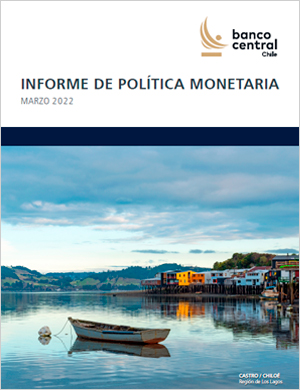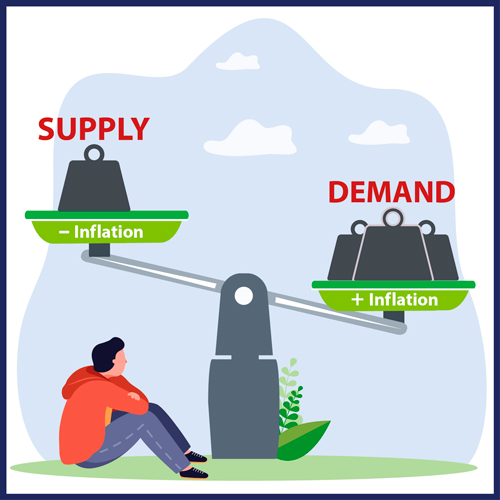Monetary Policy Report March 2022
Monetary Policy Report March 2022

Inflation and its short-term outlook have continued on an upward path, and levels near 10% are anticipated by mid-2022. The higher inflation is having a significant impact on households, and continues to respond mainly to the overspending of recent quarters. This impact has been heightened against a backdrop of significant cost-push pressures, which have increased again due to the commodity price shock triggered by Russia’s invasion of Ukraine. The central projection scenario considers that in the latter part of 2022 inflation will begin to converge to the 3% target, which will be reached within the two-year horizon. Resolving the imbalances that accumulated in the economy in recent quarters is vital for this convergence, fundamentally by adjusting the fiscal and monetary impulse, among other measures. Consistent with this, and with a less favorable external scenario, after the excessive growth of 2021, the economy will grow under its potential in 2022 and 2023, with contractions in private consumption and investment. The Board has rapidly adjusted the MPR to a contractionary level, which is necessary for it to contribute to the closing of the activity gap and the convergence of inflation within the monetary policy horizon. Also, considers that, if the assumptions in the central scenario prove correct, future increases in the MPR would be smaller than those of recent quarters.
What does this MP Report tell us?

Inflation has become a major problem for the country...
- The CPI’s annual change has continued to rise in recent months and now stands at around 8%, unexpectedly high with respect to projections.
- The excessive increase in spending, especially on durable consumer goods, continues to be the main factor behind the rise in inflation.
- Worth noting are the cases of new cars (+20.6% y/y), home repair materials (+16.5% y/y), and home furnishings (+11.7% y/y), whose prices have risen accordingly.

... resulting from a major imbalance between supply and demand, which needs to be solved.
- In recent quarters, personal spending has been boosted dramatically due to various income-support measures applied.
- This led to an excessive increase in consumption, which met with a supply that has been unable to fully recover from the effects of the pandemic and resulting increases in business costs. All this has been accompanied by a significant increase accumulated by the exchange rate over the last couple of years.
- Lowering inflation from its high levels requires solving the imbalance between supply and demand. This means that the GDP growth rate will be very low or even negative for some time.

The economy is subject to important risks that might affect the correction of those macroeconomic imbalances.
- If the factors that have caused this higher inflation are not promptly controlled the problem may become more complex and costlier.
- The speed of this adjustment is also important, as it could have significant effects on the labor market.
- The invasion of Ukraine is an added risk. So far, the greatest impacts have concentrated in the countries in conflict and their neighbors, but this could change if the war is prolonged or spreads to other countries.

The Central Bank will remain vigilant to the evolution of inflation, always concerned about the welfare of individuals.
- The Central Bank has continued to raise the monetary policy interest rate so as to encourage people to save and limit their spending. This will help prices to rise more slowly, as they did in the past.
- Maintaining a healthy economy is very important for the country to be able to achieve sustainable growth, create jobs, and keep inflation low and stable.
- This requires reducing the extraordinary impulse of the past two years. Failure to do so will only aggravate the inflation problem and increase the burden on every family in the country.
Presentations
Informe de Política Monetaria Marzo 2022. Rosanna Costa, Presidenta
Conferencia de prensa Informe de Política Monetaria marzo 2022
- Informe de Política Monetaria Marzo 2022. Rosanna Costa, Presidenta
- Presidenta Rosanna Costa, Presentación IPoM marzo 2022 en Icare
- Consejero Alberto Naudon, Presentación IPoM marzo 2022 en Banchile
- Presidenta Rosanna Costa, Presentación IPoM marzo 2022 en Larraín Vial
- Consejero Alberto Naudon, Presentación IPoM marzo 2022 en Universidad Nacional Andrés Bello
- Vicepresidente Pablo García, Presentación IPoM marzo 2022 en Bank of America
- Vicepresidente Pablo García, Presentación IPoM marzo 2022 en Junta de Adelanto del Maule y Universidad de Talca
- Consejero Luis Felipe Céspedes, Presentación IPoM marzo 2022 en HSBC y grupo de inversionistas extranjeros
- Consejero Alberto Naudon, Presentación IPoM marzo 2022 en Libertad y Desarrollo.
- Presidenta Rosanna Costa, Presentación IPoM marzo 2022 en ASIVA
